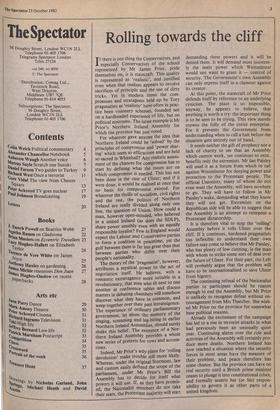Rolling towards the cliff
If there is one thing the Conservatives, and especially Conservatives of the school represented by Mr James Prior, pride
themselves on, it is statecraft. This quality is represented as 'realistic', and justified even when that realism appears to involve sacrifices of principle and the use of dirty tricks. Yet in modern times the com- promises and stratagems held up by Tory pragmatists as `realistic' have often in prac- tice been visionary schemes, founded not on a hardheaded experience of life, but on political nostrums. The latest example is Mr Prior's Northern Ireland Assembly for which the province has just voted.
For whatever gave anyone the idea that Northern Ireland could be 'solved' by the principles of compromise and 'power shar- ing' which seem so efficacious and are held so sacred in Whitehall? Any realistic assess- ment of the chances for compromise has to start by defining what the issues are on which compromise is needed. This has not been done in the case of Ulster; and if it were done, it would be realised at once that no basis for compromise existed. For whatever the thrills of socialism, civil rights and the rest, the politics of Northern Ireland are really divided along only one line, the question of Union. How could a man, however open-minded, who believed in a united Ireland (as does the SDLP), share power sensibly even with an equally responsible loyalist? Few in England would expect the Labour and Conservative parties to form a coalition in peacetime, yet the gulf between them is far less great than that between parties who differ over their people's nationality. The theory of the 'pragmatist', however, attributes a mystical power to the act of negotiation itself. He believes, with a romantic extravagance more suitable in a revolutionary, that men who sit next to one another at conference tables and discuss matters in debating chambers will somehow discover what they have in common, and weep together over their past intransigence. The experience of ordinary parliamentary government, let alone the memory of the singing, screaming and leg-biting in earlier Northern Ireland Assemblies, should surely shake this belief. The existence of a Nor- thern Ireland Assembly provides a whole new series of pretexts for rows and accusa- tions.
Indeed, Mr Prior's wily plans for 'rolling devolution' make trouble still more likely. Whereas, under the original Stormont, law and custom easily defined the scope of the parliament, under Mr Prior's Bill the Assembly has to decide for itself what powers it will use. If, as they have promis- ed, the Nationalist members do not take their seats, the Protestant majority will start
demanding these powers and it will be denied them. It will demand most insistent- ly the main power which Westminster would not want to grant it — control of security. The Government's own Assembly can only express itself in a clamour against its creator.
At this point, the statecraft of Mr Prior defends itself by reference to an underlying cynicism. The place is so impossible, anyway, he appears to believe, that anything is worth a try: the important thing is to be seen to be trying. This view merely crowns the folly of the entire enterprise. For it prevents the Government from understanding when to call a halt before the situation gets entirely out of hand.
It needs neither the gift of prophecy nor a lack of charity to see that an Assembly which cannot work, yet continues to exist, benefits only the extremists. Mr Ian Paisley will used it as a forum from which to rail against Westminster for denying power and protection to the Protestant people. The official Unionists, many of whom do not even want the Assembly, will have nowhere to go. They will have to follow in Mr Paisley's wake, demanding what they know they will not get. Extremists on the Republican side will be able to suggest that the Assembly is an attempt to reimpose a. Protestant dictatorship.
It is therefore vital to stop the 'rolling' Assembly before it rolls Ulster over the' cliff. If it continues, hardened pragmatists too inflexible to understand their own failure may come to believe that Mr Paisley, who has plenty of low cunning, is the man with whom to strike some sort of deal over the future of Ulster. For their part, the Left will probably argue that the problem will have to be internationalised to save Ulster from bigotry.
The continuing refusal of the Nationalist parties to participate should be reason enough to end the Assembly, but Mr Prior is unlikely to recognise defeat without en- couragement from Mrs Thatcher. She wish- ed Mr Prior on the province for somewhat base political reasons.
Already the excitement of the campaign has led to a rise in terrorist attacks in what had previously been an unusually quiet year. Continuing alarm over the role and activities of the Assembly will certainly pro- duce more deaths. Northern Ireland has now reached a situation where the security forces in most areas have the measure of their problem, and peace therefore' has some chance. But the province can have no real security until a British prime minister ceases to plunge it into constitutional crises, and formally asserts her (or his) respon- sibility to govern it as other parts of a united kingdom.










































 Previous page
Previous page